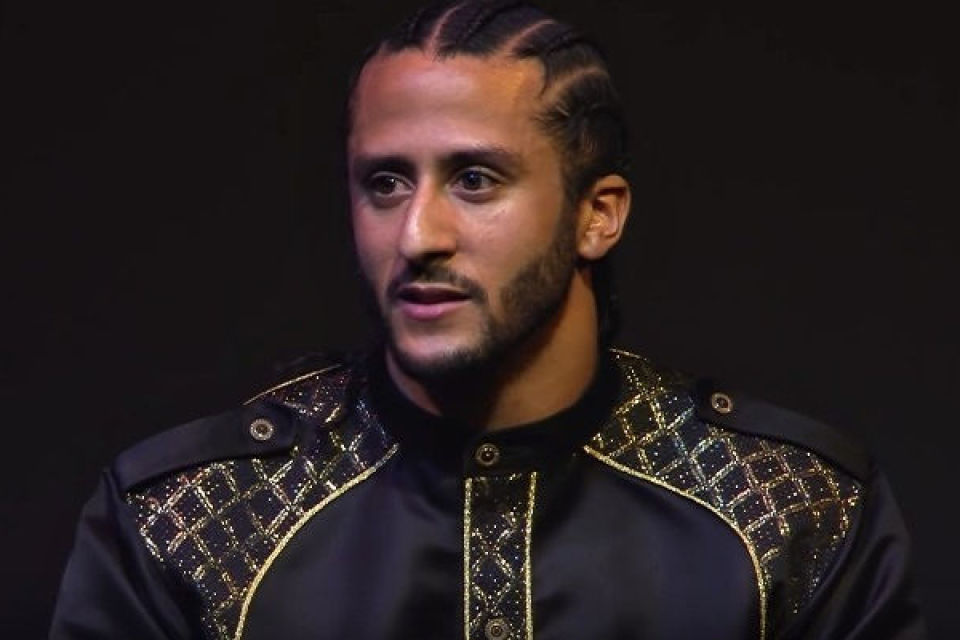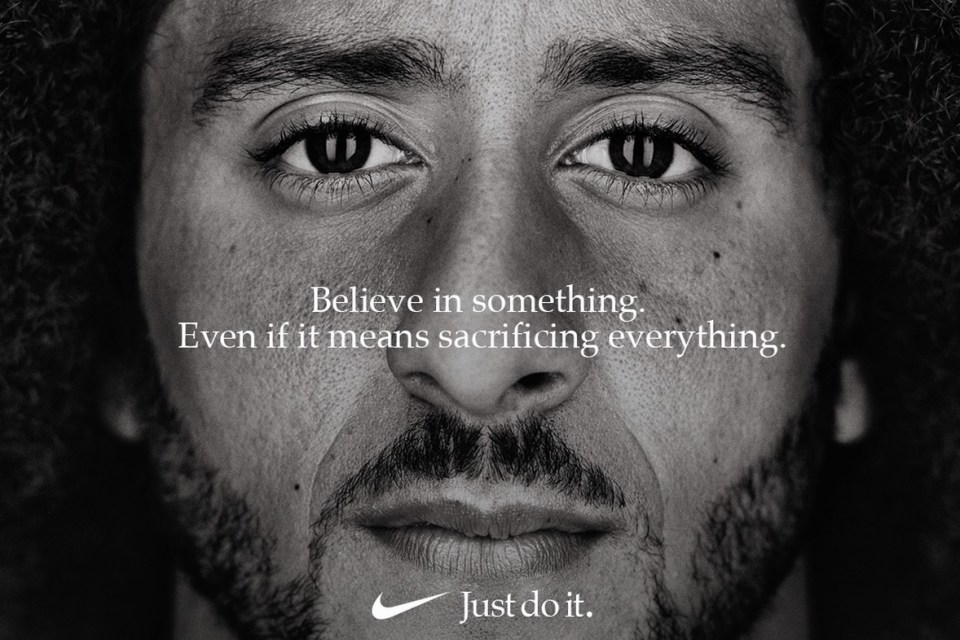Athletes and activism
Colin Kaepernick and athletic activism
Nike recently debuted an ad featuring former San Francisco 49ers quarterback Colin Kaepernick along with the tagline, “Believe in something. Even if it means sacrificing everything.” The tagline implies that Kaepernick’s continued unemployment following his early 2017 release is a consequence of his protest.
The ad, along with the accompanying tagline, quickly revived debate over Kaepernick’s decision during the National Football League’s 2016–17 season to kneel during pregame performances of the national anthem. Kaepernick said he knelt in protest of racial injustice and police brutality in the United States. However, many of his critics saw the gesture as disrespectful to the flag, the U.S. military, and the nation.
Just days before Nike’s ad was released, Kaepernick received a ruling granting him a full hearing regarding his employment claims against the NFL. Last fall, Kaepernick filed a grievance claiming that NFL teams and employees colluded “to deprive [him] of employment rights in retaliation for [his] leadership and advocacy for equality and social justice.” Such collusion would violate the NFL’s collective bargaining agreement with its players. Eric Reid, a former safety for the 49ers who knelt alongside Kaepernick, has also gone unsigned and has filed a similar grievance.
The NFL collective bargaining agreement sets a high burden of proof for collusion. Despite this, Kaepernick and Reid are speaking out about what they see as unethical, illegal treatment. This speech comes with a price. As Jason Reid writes for ESPN’s website The Undefeated, Kaepernick’s grievance effectively forecloses his future in the NFL. “In a better world,” writes Reid, “Kaepernick wouldn’t face retaliation from owners for merely exercising his rights as a member of the NFL Players Association. In this universe, however, people hold grudges.”
Starting conversations
Kaepernick’s story is only one example of the many prominent athletes who have used their status in recent years to effect social change. The actions of these athletes illustrate several different forms that social activism can take and offer a lot to think about as we try to discern how God may be calling us to influence society as people of faith.
In 2016, Megan Rapinoe, midfielder for the Seattle Reign in the National Women’s Soccer League, became the first white athlete to take a knee during the national anthem. She says she knelt to show solidarity with Kaepernick and to provoke conversations that might raise more awareness and promote solutions to racial injustice. “If you are in a position of influence like I am,” she wrote in The Players’ Tribune, “you can use your platform to elevate the millions of voices being silenced.”
Rapinoe has also used her influence to combat homophobia and to seek equal pay for women in the US Soccer Federation (USSF), who earn about 25 percent of what male players earn, according to her wage-discrimination complaint against the USSF. “You can’t really speak out on one thing and not another without it not being the full picture,” she told The Guardian in 2017. “We need to talk about a larger conversation in this country about equality in general and respect.”
Conversation alone isn’t enough to bring about social change, but meaningful change can’t happen without it. “Having these kinds of conversations can be difficult and complex, but so what?” Rapinoe writes in her article in The Players’ Tribune. “This is not a ‘them’ problem — this is an ‘us’ problem.”
Strengthening the present and future community
When the school year started this fall in Akron, Ohio, 240 third- and fourth-graders from low-income families became the first class at the new I Promise School, a partnership between Akron Public Schools and NBA superstar LeBron James. The four-time MVP said on Twitter that opening the school in his hometown would be “one of the greatest moments (if not the greatest)” of his life.
I Promise provides students with what James’s charitable foundation calls “a complete wraparound for its students and their families.” This includes a challenging eight-hour school day, an on-site food bank, GED and job placement services for students’ parents, and guaranteed full tuition to the University of Akron for every student who graduates.
While other star athletes like Deion Sanders and Andre Agassi have started charter schools, I Promise is a public school. Writing for Slate, Jordan Weissmann says James is “sending the message that it’s worth investing in our traditional public education systems, and that they should be trusted to run socially and academically ambitious schools.”
The I Promise School shows how activism entails investing for the good of the community — not just as it currently is, but also as it can and should be. Activism also means seeing the good one can do and seizing the opportunity to do it. As quoted on The Root website, James said at the school’s opening, “For me to be in the position where I have the resources, the finance, the people, the structure and the city around me — why not?”
Stick to sports?
Earlier this year, Fox News host Laura Ingraham responded to LeBron James’s criticism of President Donald Trump by telling James that he should “shut up and dribble.” Ingraham’s attitude isn’t new, and activist athletes have often drawn complaints that they should “stick to sports.” But does this demand seek to make athletes choose between their roles as athletes and their identities as concerned citizens with ideas and beliefs about important social issues? Is that the kind of separation we can honestly ask someone to make?
Christians should be able to appreciate the difficulty of this demand. How easy or hard would you find it to separate your identity as a member of society from your identity as a follower of Jesus? Jesus himself reiterated the Torah’s command to love God single-mindedly and wholeheartedly (Matthew 22:37; see Deuteronomy 6:5). The apostle Paul exhorted believers, “Whatever you do . . . do it all in the name of the Lord Jesus” (Colossians 3:17). How, then, can we divide what we believe from what we do in society as we witness to God’s will and seek to enact that will?
Be sure to check out FaithLink, a weekly downloadable discussion guide for classes and small groups. FaithLinkmotivates Christians to consider their personal views on important contemporary issues, and it also encourages them to act on their beliefs.


